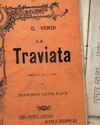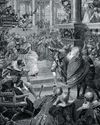
The year is 1794. The Reign of Terror is in full swing in Revolutionary France, with thousands being executed at the guillotine. The latest imprisoned aristocrat appears before the Committee of Public Safety who will decide her fate. She is not alone. As well as the police guard, this 30-year-old woman is accompanied by an item more typically found in a Parisian salon than a courtroom – a piano. She is reputed to be one of the country’s finest musicians, and if she’s good, as the delegation of musicians advocating for her have promised, then she could be of use, first for ‘patriotic events’, later at the capital’s new conservatoire. She is invited to take her seat at the keyboard, to play for her very life.
Almost inevitably, she is asked to perform La Marseillaise, a 1792 rallying cry that would soon become the national anthem of the new French republic. What the pianist does with it is unexpected: after playing the tune, she begins to improvise variations on it, the music gradually building to a great climax, the melody billowing out over arpeggios. The men listening are moved to tears. She walks free.
This story is from the December 2022 edition of BBC Music Magazine.
Start your 7-day Magzter GOLD free trial to access thousands of curated premium stories, and 9,000+ magazines and newspapers.
Already a subscriber ? Sign In
This story is from the December 2022 edition of BBC Music Magazine.
Start your 7-day Magzter GOLD free trial to access thousands of curated premium stories, and 9,000+ magazines and newspapers.
Already a subscriber? Sign In

A way with words
Great operas are inextricably linked with their composer but, asks Jessica Duchen, how often do we acknowledge the important role of the librettist?

THE MAGNIFICENT SEVEN Pick a theme... and name your seven favourite examples
Conductor Domingo Hindoyan nominates the best musical depictions of anger and frustration
A glittering beacon
Until its destruction in the fire of 1936, the Crystal Palace was one of the world's most exciting music venues, and its legacy still lives on today, writes Tom Service.

Christoph Willibald Gluck
Paul Riley traces the wandering existence of a cosmopolitan composer who made it his life's work and ambition to rip up opera's rulebook

The Awards are upon us once more!
Time to vote for the best recordings of the last 12 months

LEADING FROM THE FRONT
From running efficient rehearsals to learning to speak to orchestras with clarity and empathy, an array of exciting courses for conductors has bloomed in recent years, finds Clare Stevens

Kindred spirits
As their second opera takes to the stage, composer Gregory Spears and librettist Tracy K Smith talk to Charlotte Smith about their special partnership

The censors' refusal to play ball drives Verdi to despair
In the early months of 1857, Verdi had Shakespeare on his mind, and specifically King Lear.

11 Bed-Hopping Composers
Jeremy Pound lifts the covers off those notorious notesmiths who found the thrill of playing away simply too hard to resist

André Rieu Violinist, Conductor
King of the Waltz, Dutch musical impresario André Rieu has taken the world by storm with his Johann Strauss Orchestra.